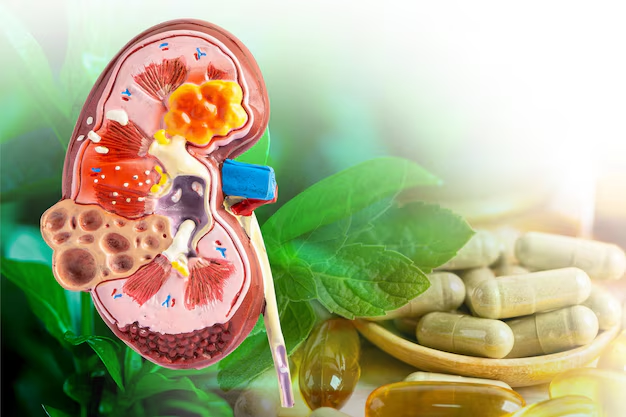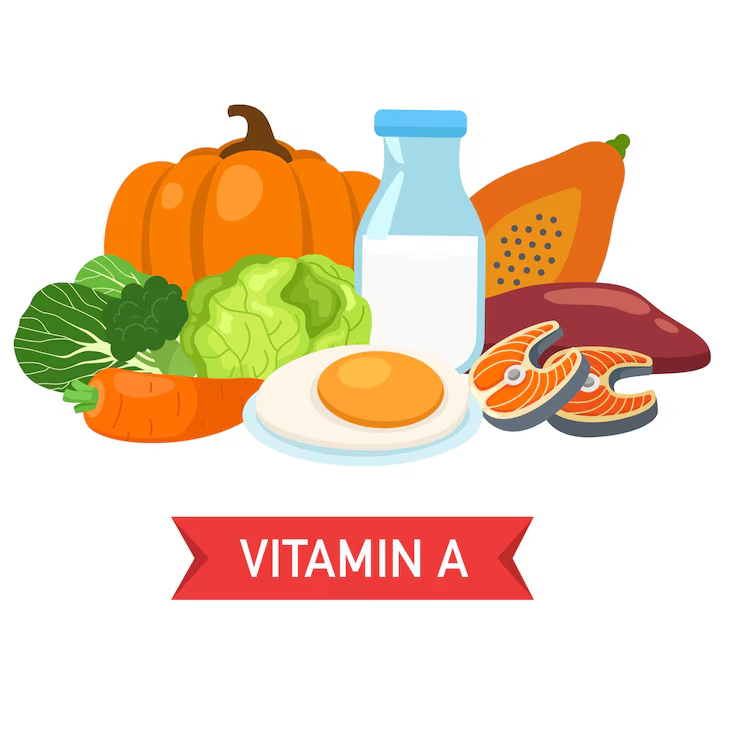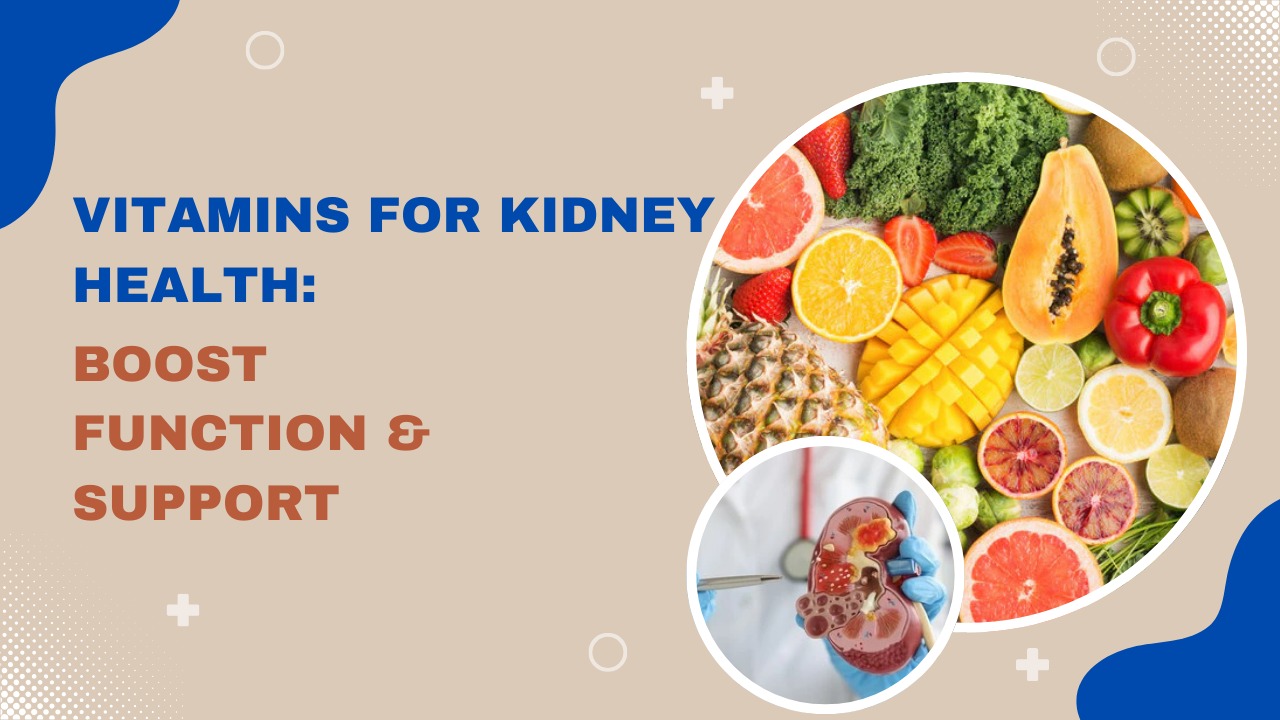Maintaining kidney health is vital for overall well-being, as these organs play a crucial role in filtering waste, balancing fluids, and regulating essential nutrients in the body. With lifestyle changes, poor diet, and rising health conditions like diabetes and hypertension, kidney-related issues are becoming more common. One effective way to support your kidneys naturally is by including the right vitamins and minerals in your daily routine.
Vitamins for kidney health are not only beneficial for preventing potential problems but also help in strengthening kidney function, reducing inflammation, and improving overall immunity. Whether through diet or supplements, choosing the right nutrients can make a huge difference in your kidney care journey.
In this article, we’ll explore what vitamins are good for kidney health, why they matter, when to take them, how they support kidney function, and where you can find them naturally. Alongside, we’ll share the top 8 tips on vitamins for kidney health with detailed benefits, sources, and expert insights.

What Are Vitamins for Kidney Health ?
Vitamins for kidney health are essential nutrients that help the kidneys filter toxins, regulate blood pressure, produce hormones, and maintain fluid balance. These vitamins can be obtained through whole foods like fruits, vegetables, seeds, and lean proteins, as well as supplements designed to support renal health.
Kidneys are particularly sensitive organs, and nutrient deficiencies can lead to chronic kidney disease (CKD) or worsen existing conditions. Ensuring proper intake of kidney-supportive vitamins may help prevent such complications and promote long-term wellness.
Why Are Vitamins Important for Kidney Health ?
Kidneys are responsible for filtering nearly 50 gallons of blood every single day. This intense process requires strong cellular protection and adequate nutrition. Without the right vitamins, kidneys become vulnerable to oxidative stress, infections, high blood pressure, and imbalanced electrolyte levels.
The right vitamins for kidney health:
Reduce inflammation
Support energy metabolism
Aid red blood cell production
Protect against free radical damage
Improve waste filtration
Thus, maintaining a balance of these vitamins can significantly lower the risk of kidney disease.
When Should You Take Vitamins for Kidney Health ?
The best time to take vitamins for kidney health depends on your body’s needs and your healthcare provider’s advice. Generally, vitamins can be taken:
Morning – for energy-boosting vitamins like B-complex.
With meals – fat-soluble vitamins (A, D, E, K) absorb better.
Before bedtime – for magnesium or calming minerals that improve sleep and reduce kidney strain.
If you have existing kidney conditions, consult a nephrologist before starting any supplements.
How Do Vitamins Help Kidney Function ?
Vitamins play an essential role in keeping your kidneys healthy and functioning properly. The kidneys are responsible for filtering waste, balancing fluids, and regulating blood pressure, all of which require the support of key nutrients. Specific vitamins for kidney health, such as Vitamin D, B6, and magnesium, help the kidneys manage minerals like calcium and phosphorus, preventing issues like kidney stones and mineral imbalance.
In addition to mineral regulation, vitamins protect the kidneys from oxidative stress and inflammation. Antioxidant-rich vitamins like Vitamin C and Vitamin E defend renal tissues from damage caused by toxins and free radicals. This protective effect is vital for preventing long-term conditions such as chronic kidney disease. Regular intake of vitamins for kidney health strengthens both filtration and detoxification processes.
Finally, vitamins also boost immunity, aid in red blood cell production, and support tissue repair. By combining these functions, vitamins for kidney health ensure optimal performance and long-term protection of these vital organs.
Vitamins work in multiple ways to support kidney health:
Vitamin D improves calcium absorption and prevents kidney stones.
Vitamin B6 reduces the buildup of harmful oxalates.
Vitamin C enhances immunity and protects against infections.
Vitamin E prevents oxidative stress that damages kidney tissues.
Magnesium regulates fluid balance and prevents kidney stones.
By ensuring an adequate intake, you help your kidneys perform their natural detoxification and balancing processes effectively.
Where Can You Get Vitamins for Kidney Health ?
The most reliable source of vitamins for kidney health is a well-balanced diet filled with fresh, whole foods. Fruits like oranges, strawberries, and kiwi provide Vitamin C, while leafy greens and carrots supply Vitamin A. Nuts, seeds, and avocados are excellent sources of Vitamin E and magnesium, while fish, eggs, and fortified dairy products offer Vitamin D. By eating a variety of these nutrient-rich foods daily, you can naturally support your kidneys and overall well-being.
In some cases, diet alone may not provide enough nutrients, especially for people with chronic kidney disease or limited food options. Here, supplements play a valuable role in maintaining adequate levels of vitamins for kidney health. Options like Vitamin D, B-complex, and magnesium are often recommended under medical supervision to correct deficiencies.
You can get vitamins for kidney health from:
Whole foods – fresh fruits, vegetables, seeds, nuts, legumes, and whole grains.
Supplements – vitamin D, B-complex, or multivitamins specifically formulated for kidney support.
Fortified foods – cereals, plant-based milks, and juices.
Natural food sources are always preferable, but supplements may be necessary in cases of deficiency or increased health risks.
Top Tips: Vitamins for Kidney Health
Here are the top 8 essential vitamins and minerals you need to support kidney health, along with their benefits and food sources.
Vitamin D – The Bone & Kidney Protector
Vitamin D is one of the most important vitamins for kidney health because it regulates calcium and phosphorus, two minerals essential for strong bones and balanced kidney function. Without enough Vitamin D, the kidneys struggle to maintain proper mineral balance, which can lead to bone weakness and kidney strain. Adequate Vitamin D helps prevent bone-related disorders such as osteoporosis, which often occur in people with chronic kidney disease.
This vitamin also plays a role in reducing the risk of kidney stones. By balancing calcium absorption, Vitamin D minimizes calcium buildup in the kidneys, which is one of the main causes of stone formation. Stronger kidney function means better waste filtration, less inflammation, and improved overall health.
Additionally, Vitamin D strengthens immunity, which is critical because kidney patients are more vulnerable to infections. Sunlight, fatty fish, eggs, and fortified foods are natural sources. A few minutes in the sun daily can greatly boost Vitamin D levels, improving both bone and kidney health.
Benefits: Helps regulate calcium and phosphorus, reduces the risk of kidney stones, strengthens bones, and boosts immunity.
Sources: Sunlight, fortified milk, eggs, salmon, tuna, and supplements.
Tip: Spend at least 15 minutes in sunlight daily or take a supplement if deficient.
Vitamin B6 – Prevents Kidney Stones
Vitamin B6 is highly beneficial when it comes to preventing kidney stones, making it one of the most essential vitamins for kidney health. It helps reduce the buildup of oxalates in the kidneys. Oxalates are natural substances found in many foods, but in excess, they can crystallize and form painful stones. With the right intake of Vitamin B6, your body metabolizes these compounds more efficiently, lowering stone risk.
This vitamin also plays a major role in protein metabolism. Since kidneys are responsible for filtering protein by-products, efficient protein breakdown reduces stress on them. People with poor Vitamin B6 levels often face higher risks of kidney complications because of excess metabolic waste.
On top of that, Vitamin B6 supports the nervous system and enhances overall energy levels. Foods like bananas, poultry, spinach, and fortified cereals are excellent sources. Regular consumption of B6-rich foods ensures smooth metabolic functions and long-term kidney protection.
Benefits: Reduces oxalate buildup in the kidneys, supports protein metabolism, and improves nervous system health.
Sources: Bananas, chicken, salmon, turkey, spinach, fortified cereals.
Tip: Include B6-rich foods daily to prevent kidney stone formation.
Vitamin C – Immune Booster for Kidneys
Vitamin C is well-known as an immunity booster, but it’s also one of the key vitamins for kidney health. It protects the kidneys from infections, especially urinary tract infections (UTIs), which can spread and damage renal tissues if untreated. By strengthening immune defense, Vitamin C lowers the chances of bacterial or viral attacks on these sensitive organs.
This vitamin also acts as a powerful antioxidant. Kidneys are constantly exposed to toxins during blood filtration, which can cause oxidative stress. Vitamin C neutralizes harmful free radicals, reducing inflammation and tissue damage. This protective function helps maintain kidney efficiency and slows down the progression of kidney diseases.
Another benefit of Vitamin C is its role in collagen formation, which supports tissue repair. For kidney patients, this means faster healing of damaged cells and stronger connective tissues. Natural sources like oranges, kiwi, peppers, and broccoli provide safe and effective amounts when taken in moderation.
Benefits: Protects against infections, enhances immunity, prevents oxidative stress, and improves collagen formation for tissue repair.
Sources: Oranges, strawberries, bell peppers, kiwi, broccoli.
Tip: Moderate intake is best, as excessive vitamin C may increase kidney stone risk.
Vitamin E – The Antioxidant Shield

Vitamin E is often called the “antioxidant shield” because it protects cells from oxidative damage, making it one of the most vital vitamins for kidney health. Since kidneys filter toxins, they are especially vulnerable to oxidative stress. Vitamin E prevents free radical damage, reduces inflammation, and keeps kidney tissues healthy.
This vitamin also lowers the risk of chronic kidney disease (CKD). Patients with CKD often experience increased oxidative stress, leading to further complications. By incorporating Vitamin E into the diet, one can reduce the severity of inflammation and protect kidney cells from further decline.
In addition, Vitamin E supports cardiovascular health. Since heart and kidney health are closely connected, improving circulation and reducing blood pressure with antioxidants also benefits the kidneys. Sources like almonds, sunflower seeds, avocado, and olive oil are rich in Vitamin E and can be easily included in everyday meals.
Benefits: Neutralizes free radicals, reduces inflammation in kidney tissues, and lowers the risk of chronic kidney disease.
Sources: Almonds, sunflower seeds, spinach, avocado, olive oil.
Tip: Use vitamin E-rich oils for cooking or as salad dressings.
Vitamin A – For Cell Growth & Repair

Vitamin A is a fat-soluble nutrient crucial for cell growth and tissue repair, making it one of the underrated but important vitamins for kidney health. It helps maintain the lining of the urinary tract, which reduces the risk of infections that can strain the kidneys. A healthy urinary tract ensures that waste passes smoothly out of the body without additional pressure on the kidneys.
Another important function of Vitamin A is boosting immunity. It strengthens white blood cell activity, helping the body fight off infections and toxins that could otherwise damage the kidneys. People with weak immunity are more likely to experience recurring infections, which can worsen kidney function over time.
Furthermore, Vitamin A supports vision and skin health, which indirectly benefits kidney patients by promoting overall well-being. Sources such as carrots, sweet potatoes, leafy greens, and apricots provide safe amounts. However, excess Vitamin A supplementation should be avoided as it may harm the kidneys.
Benefits: Supports tissue repair, boosts immunity, and maintains healthy skin and mucous membranes (important for urinary tract health).
Sources: Carrots, sweet potatoes, leafy greens, apricots, liver.
Tip: Take vitamin A in balanced amounts; excess intake may harm the kidneys.
Magnesium – Stone Prevention Mineral
Magnesium is a mineral that plays a critical role in preventing kidney stones, making it one of the essential minerals often grouped with vitamins for kidney health. It regulates how calcium and oxalates interact in the body, preventing them from crystallizing into stones. Adequate magnesium intake ensures a smooth balance between minerals, reducing stone risk significantly.
Magnesium also helps in maintaining proper blood pressure levels. Since hypertension is a leading cause of kidney disease, having enough magnesium lowers strain on the kidneys and improves filtration capacity. Balanced blood pressure further ensures that the kidneys are not overworked, reducing long-term damage.
Additionally, magnesium helps reduce stress and supports relaxation. This indirectly benefits kidney health, as stress and poor sleep can worsen renal conditions. Natural sources like nuts, seeds, leafy greens, and legumes are excellent ways to increase magnesium intake without supplements.
Benefits: Regulates blood pressure, balances fluids, prevents kidney stones, and reduces stress on the kidneys.
Sources: Pumpkin seeds, almonds, dark chocolate, leafy greens, legumes.
Tip: Add magnesium-rich snacks like nuts and seeds into your diet.
Iron – Oxygen Transporter for Kidneys
Iron is one of the most crucial minerals for blood health and, by extension, one of the essential vitamins for kidney health when viewed from a nutritional perspective. The kidneys rely heavily on oxygenated blood for their function, and iron plays a key role in producing hemoglobin, the protein responsible for carrying oxygen. Without adequate iron, anemia may develop, which can weaken kidney function.
Iron deficiency is common among kidney patients, as reduced kidney function lowers the production of erythropoietin, a hormone that stimulates red blood cell formation. Adequate iron intake helps counter this deficiency and ensures that both the body and kidneys receive sufficient oxygen supply.
Iron also boosts energy levels and reduces fatigue, which are common symptoms of kidney problems. Lean red meat, lentils, spinach, and fortified cereals are rich iron sources. Pairing these foods with Vitamin C improves absorption, making them more effective in supporting kidney health.
Benefits: Supports red blood cell production, prevents anemia (common in kidney disease patients), and improves energy levels.
Sources: Lean red meat, spinach, lentils, fortified cereals.
Tip: Pair iron-rich foods with vitamin C for better absorption.
Zinc – The Immunity Mineral
Zinc is another powerful mineral that supports kidney wellness and is often included in discussions about vitamins for kidney health. It plays a major role in boosting immunity, ensuring that the body can fight infections that may damage the kidneys. Strong immunity is vital for kidney patients, as even minor infections can cause significant harm.
This mineral also aids in wound healing and tissue repair. For people with kidney conditions, faster healing is important because their bodies often recover slower. Zinc supports cell growth and regeneration, reducing long-term tissue damage.
Additionally, zinc functions as an antioxidant, lowering oxidative stress in the kidneys. By protecting renal tissues from damage, zinc helps preserve their filtering capacity. Foods like chickpeas, pumpkin seeds, cashews, and seafood are excellent natural sources of zinc that can be easily added to daily meals.
Benefits: Boosts immunity, aids wound healing, supports enzyme functions, and reduces oxidative stress in kidneys.
Sources: Chickpeas, pumpkin seeds, cashews, whole grains, seafood.
Tip: Include zinc-rich foods to maintain kidney and urinary tract health.
Additional Tips for Kidney Health
Stay hydrated with adequate water.
Limit excessive sodium and processed foods.
Avoid smoking and excess alcohol.
Maintain a balanced weight with regular exercise.
Conclusion

Kidneys are vital to your body’s detoxification and overall health. Supporting them with the right vitamins for kidney health ensures they function optimally while reducing the risk of chronic conditions. From Vitamin D and B6 to magnesium and zinc, each nutrient plays a unique role in protecting kidney function and overall wellness.
By understanding what vitamins are needed, why they matter, when to take them, how they help, and where to find them, you can make smarter lifestyle choices that strengthen your kidneys naturally. Incorporating these nutrients through diet and supplements, along with healthy daily habits, ensures a strong foundation for lifelong kidney support.
FAQs
Q1. What are the best vitamins for kidney health ?
The best vitamins include Vitamin D, B6, C, E, A, magnesium, iron, and zinc.
Q2. Why should I take vitamins for kidney health ?
They prevent kidney stones, reduce inflammation, boost immunity, and support proper filtration.
Q3. When should I take vitamins for kidney health ?
Morning or with meals is best, but it depends on the vitamin type and your doctor’s advice.
Q4. How do vitamins help improve kidney function ?
They enhance detoxification, reduce oxidative stress, improve blood circulation, and regulate minerals.
Q5. Where can I get vitamins for kidney health naturally ?
From whole foods like fruits, vegetables, nuts, seeds, and lean proteins, or through supplements if needed.



